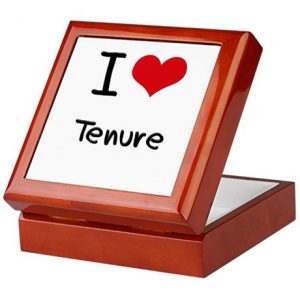 THE “MAGIC” BOX
THE “MAGIC” BOX During my recent promotion process, I began using the term “magic box” to describe the actual storage container, several in my case, that faculty members must use to report their scholarly productivity, teaching and service when applying for either tenure or promotion, or both. On multiple occasions, I had heard about the need to file hard copies of all academic materials, which would then be scrutinized by diverse tenure and promotion committees throughout the application process. Nevertheless, I was still not sure of what the actual box should look like—so that was how the term “magic box” came into existence. I thereafter began to use it to vaguely name an object that I knew would be needed throughout the promotion process, and that I knew would have the power to change the odds in my favor (despite the fact that I still was not quite certain about what was supposed to go in it). Lo and behold, I discovered that I was not alone.
Although most faculty members keep a careful record of their multi-tasking activities—including a well formatted and up-to-date curriculum vitae—not all of us are aware of the need to routinely collect detailed “evidence” of our daily academic routines and contributions. And by “evidence” I mean anything, and everything, that can eventually be considered a sound record of our itemized achievements: from a formal letter confirming a book award and an approved budget for an NSF grant, to an e-mail from an editor thanking us for reviewing an article.
Given the fact that standards differ across universities, colleges, divisions, programs—and that they even change within departments over time—there isn’t a one-size-fits-all rule when it comes to showing evidence of our productivity and service. In some divisions, copies of a slideshow of an important keynote presentation can strengthen a candidate’s record, but in others, these materials may be considered superfluous.
While doing my own “bean counting” to update my scholarly feats, I realized that I had not been keeping and filing all the materials that appeared in my C.V., and actually found many important things that were missing. A regrettable example of this was the fact that although I had received early promotion (to associate professor) at my former institution, I did not have any material evidence to prove it. Subsequently, I quickly turned into a sort of “scholarly detective” and began searching franticly—and finding one by one—all of my missing records, including a form from my former institution’s human services office, which confirmed my early promotion.
Today, I secretly cherish my three huge “magic boxes” that remain piled on top of each other in a corner of my office. They are the material proof of my—by now—long trajectory in the academic world. Even if painful, the exercise of making the boxes visible forced me to become accountable to myself, and others, with respect to the enormous amount of work, and resulting accomplishments, I have amassed throughout the years. Although the physical box will hopefully soon been replaced by faculty’s electronic files—as is already the case at most CUNY colleges—its symbolic meaning will probably remain for years to come.

